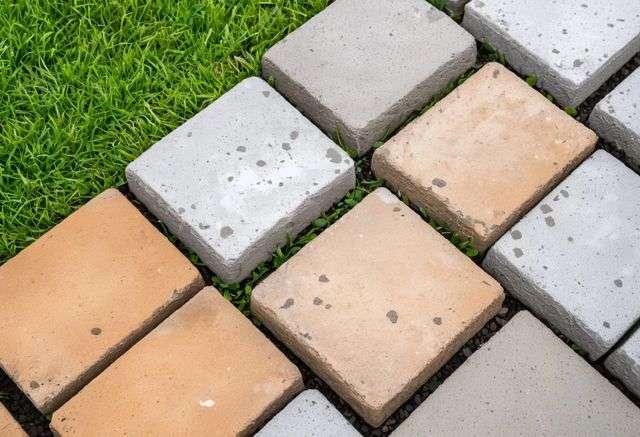
Key Considerations When Sealing Concrete Pavers

When sealing concrete pavers, consider the weather protection and color preservation benefits, as sealing creates a barrier against weather damage and UV rays. Additionally, select the appropriate type of sealer based on the specific needs of your pavers, such as durability for high-traffic areas or aesthetics for maintaining their natural look.
Understanding the Importance of Sealing Concrete Pavers
Learn why sealing concrete pavers is essential for maintaining their appearance and longevity. Sealing offers numerous benefits that help protect and enhance your concrete pavers.
Sealing concrete pavers guards against various types of stains, including oil and grease, which can penetrate the surface and become permanent. How to Remove Different Types of Stains from Pavers: Oil, Grease, Hard Water, and Rust explains more about common stains and their removal methods. This protection makes it easier to clean and maintain the pavers.
- Weather Protection: Sealing creates a barrier that protects pavers from weather damage. It reduces the impact of harsh sunlight, rain, and freeze-thaw cycles, which can cause cracks and erosion over time.
- Color Preservation: UV rays can cause the colors of concrete pavers to fade. A quality sealer helps in retaining the original color, ensuring that your outdoor space remains vibrant.
Sealed pavers are also less likely to suffer from weed and mold growth in the joints. This maintains the aesthetic appeal and structural integrity of your paving. Learn more about Avoiding Invasive Plants in Your Patio.
Using a good sealer can increase the lifespan of concrete pavers by reducing wear and tear. This is especially vital for high-traffic areas like driveways and walkways.

Choosing the Right Sealer for Your Pavers
Discover the range of sealers available for concrete pavers to protect and enhance them. Choose the right sealer based on your specific needs and the unique properties each one offers.
Acrylic Sealers:
- Pros:
- Provide a shiny finish that enhances color.
- Dry quickly, making application fast.
- Resist UV rays, preventing discoloration.
- Cons:
- May wear down faster in high-traffic areas.
- Require reapplication every 1-3 years.
Epoxy Sealers:
- Pros:
- Extremely durable and long-lasting.
- Provides a glossy, high-strength surface.
- Excellent resistance to stains and chemicals.
- Cons:
- More expensive than other sealers.
- Can be slippery when wet.
Penetrating Sealers:
- Pros:
- Penetrate deep into the pavers, offering long-term protection.
- Maintain the natural look of the pavers without a glossy finish.
- Ideal for areas exposed to harsh weather.
- Cons:
- Generally more expensive upfront.
- More complex application process compared to surface sealers.
When selecting a sealer, consider:
- Traffic: High traffic areas may benefit more from durable options like epoxy.
- Climate: Areas prone to severe weather may need penetrating sealers for deep protection.
- Aesthetics: Choose acrylic for a glossy, vibrant finish or penetrating sealers for a natural look.
Selecting the right sealer ensures your concrete pavers remain protected and aesthetically pleasing for years to come. Our Top Edge Designs for Paver Patios offers more on enhancing the aesthetic appeal of your pavers.
Proper Timing for Sealing Pavers
Timing is crucial when sealing concrete pavers for optimal protection and durability. The sealant should be applied only after the pavers have fully cured, which typically takes around 28 days for new pavers. Sealing too early can trap moisture, affecting the integrity of the pavers.
Consider the weather conditions before sealing. Ideal weather includes a few days of dry conditions before and after the application to ensure proper adhesion and curing of the sealant. Rain or wet conditions can hinder the sealing process, making the sealant less effective.
Seasonal considerations are also important. Sealing during extreme cold or hot temperatures should be avoided as it can affect the performance of the sealant. Spring and fall are generally the best times for sealing as temperatures are moderate and stable.
For existing pavers, cleaning is essential before sealing. Remove dirt, stains, and any old sealant to ensure the new layer adheres properly. Best Practices for Installing Pavers includes further advice on preparing and maintaining your pavers.
In summary:
- Allow new pavers to cure for 28 days.
- Choose a period of dry weather for sealing.
- Avoid sealing in extreme temperatures.
- Clean existing pavers thoroughly before sealing.

Step-by-Step Guide to Sealing Concrete Pavers
Follow these detailed instructions to seal your concrete pavers properly, covering the preparation, application, and drying process:
- Clear the Area: Remove all furniture and plants to protect them from cleaning chemicals and ensure full access to the paver surface.
- Remove Vegetation: Clear moss and weeds between the pavers. Use a vegetation killer if needed and wait at least two weeks before sealing to allow the killer to work effectively.
- Clean the Pavers: Saturate the pavers with water to prevent absorption of cleaning solutions. Apply a mild degreaser detergent mixed with warm water and scrub with a stiff-bristled broom. Rinse thoroughly with a garden hose or power washer to remove all cleaning residue.
- Re-sand the Joints: Once the pavers are dry, re-sand the joints with polymeric sand. Lightly mist the sand with water to help it settle, but be careful not to wash it away.
- Apply the Sealer:
- Choose a sealer based on your desired look and level of stain resistance.
- Apply sealer to the edges with a small brush first.
- Use a roller to cover the entire surface.
- Apply two coats, allowing the specified drying time between coats. Ensure the sealer does not pool on the surface.
- Drying Time: Allow the sealer to dry for at least 24 hours before replacing furniture and plants.
By following these steps, you maintain the aesthetic and durability of your pavers for years to come.

Maintenance Tips to Extend the Life of Sealed Pavers
After sealing, maintaining your pavers is crucial to ensure their longevity. Follow these tips to keep your sealed pavers in top condition:
- Regular Cleaning: Sweep your pavers frequently to remove dirt and debris. Use mild soap and water for deeper cleaning, avoiding harsh chemicals that can damage the sealant. For more guidance, explore our 5 Tips to Keep Your Pavers in Top Condition.
- Reapply Sealant: Depending on wear and tear, reapply sealant every 3-5 years. This keeps the protective layer intact and enhances the pavers’ resistance to stains and weather damage.
- Handle Common Issues:
- Moss and Weeds: Remove moss and weeds promptly to prevent them from undermining the pavers.
- Stains: Address oil stains, rust, and other marks quickly. Use appropriate cleaners that won’t harm the sealant.
- Inspect and Repair: Regularly inspect for cracks or chips. Promptly repair any damage to avoid further deterioration and maintain a smooth, even surface.
- Avoid Harsh Conditions: Take extra care during extreme weather. Use protective mats or covers when necessary to shield the pavers from intense sunlight, heavy rain, or snow.
By following these tips, you can extend the life of your sealed pavers and enjoy a beautiful, well-maintained outdoor space for years. For professional help with sealing and maintaining your pavers, GET YOUR FREE ESTIMATE TODAY. Learn more about our paver services for comprehensive solutions.

FAQ
Why is sealing concrete pavers important?
Sealing concrete pavers is crucial for maintaining their appearance and longevity. It guards against stains, weather damage, UV rays, and weed or mold growth, making pavers easier to clean and maintain.
What types of sealers are available for concrete pavers?
There are three main types of sealers for concrete pavers:
- Acrylic Sealers: Provide a shiny finish, quick drying, and UV resistance but require frequent reapplication.
- Epoxy Sealers: Offer a durable, glossy surface with excellent stain resistance but can be expensive and slippery when wet.
- Penetrating Sealers: Penetrate deeply for long-term protection while maintaining a natural look, ideal for harsh weather but are more expensive and complex to apply.
When is the best time to seal pavers?
The best time to seal pavers is after they have fully cured, typically 28 days for new pavers. Ideal sealing conditions include dry weather and moderate temperatures, typically in spring or fall. Avoid sealing during extreme hot or cold temperatures.
How do I prepare and seal my concrete pavers?
To seal concrete pavers:
- Clear the area of furniture and plants.
- Remove vegetation and clean the pavers with a mild degreaser detergent.
- Re-sand the joints with polymeric sand.
- Apply the sealer to the edges with a small brush, then use a roller for the entire surface.
- Allow two coats to dry with the specified time between each coat before replacing furniture and plants.
How often should I reseal my pavers?
Depending on the wear and tear, you should reseal your pavers every 3-5 years to maintain their protective layer and enhance their resistance to stains and weather damage.
What are some maintenance tips for sealed pavers?
- Regular Cleaning: Sweep frequently and use mild soap and water for deeper cleaning.
- Reapply Sealant: Reseal every 3-5 years.
- Handle Issues Promptly: Remove moss, weeds, and stains quickly.
- Inspect and Repair: Regularly check for and repair cracks or chips.
- Avoid Harsh Conditions: Use protective mats or covers during extreme weather.
Sources
The article “Key Considerations When Sealing Concrete Pavers” utilized information from several sources, including:
- How to Seal Pavers from WikiHow
- Workshop Tips from All Around the Homestead from Agriculture.com
- Fayetteville Business Owners Speak on Sidewalk Construction from WAFF
- 7 Best BBQ Grill Covers of 2024 from JPost
- Powder-Type Self-Compacting Concrete Market from The Indian Movie Channel
- Protecting Everything from Bridges to Art from Business Insider
- Reasons to Use Home Equity Before June from CBS News
- New Features Announced for Concrete Expo from PBC Today
- Smart Home Equity Moves to Make This June from CBS News
- Ways to Maximize Your Home Value from CBS News
